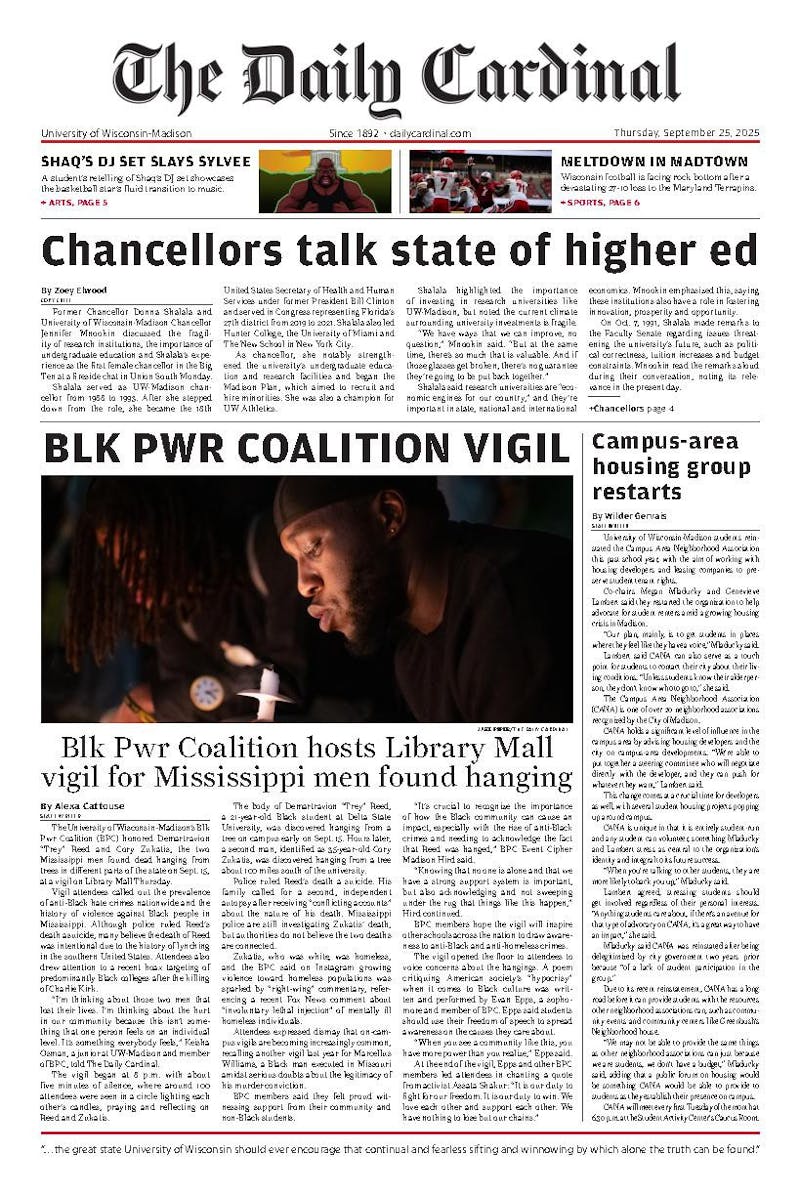Former Chancellor Donna Shalala and University of Wisconsin-Madison Chancellor Jennifer Mnookin discussed the fragility of research institutions, the importance of undergraduate education and Shalala’s experience as the first female chancellor in the Big Ten at a fireside chat in Union South Monday.
Shalala served as UW-Madison chancellor from 1988 to 1993. After she stepped down from the role, she became the 18th United States Secretary of Health and Human Services under former President Bill Clinton and served in Congress representing Florida’s 27th district from 2019 to 2021. Shalala also led Hunter College, the University of Miami and The New School in New York City.
As chancellor, she notably strengthened the university’s undergraduate education and research facilities and began the Madison Plan, which aimed to recruit and hire minorities. She was also a champion for UW Athletics.
Shalala highlighted the importance of investing in research universities like UW-Madison, but noted the current climate surrounding university investments is fragile.
“We have ways that we can improve, no question,” Mnookin said. “But at the same time, there’s so much that is valuable. And if those glasses get broken, there’s no guarantee they’re going to be put back together.”
Shalala said research universities are “economic engines for our country,” and they’re important in state, national and international economics. Mnookin emphasized this, saying these institutions also have a role in fostering innovation, prosperity and opportunity.
On Oct. 7, 1991, Shalala made remarks to the Faculty Senate regarding issues threatening the university’s future, such as political correctness, tuition increases and budget constraints. Mnookin read the remarks aloud during their conversation, noting its relevance in the present day.
“It was really striking to me —the parallels — which in a certain way was comforting because we got through hard things then and so, presumably, we can do it again,” Mnookin said.
Mnookin asked Shalala what she makes of the current climate surrounding higher education, emphasizing fiscal challenges and growing distrust in higher education institutions.
“It’s easy to say it’s all cyclical, but I think we’re in a much more dangerous period. I am more wary now than I was even then,” Shalala said, emphasizing the urgency of preserving hope and continuing university improvements.
“What we do is too important to the future of the country,” Shalala continued. “Our job as leaders is to rally everyone and say, ‘even though we have differences, we still have to move ahead and keep improving, recognizing that we have some vulnerabilities, but keep working and not giving up hope.’”
Mnookin highlighted Shalala’s strength in recognizing and engaging with all perspectives, no matter the differences.
“It requires compromise,” Shalala said. “People criticize universities for making some of those compromises, but we’re interested — not in the survival of our institutions — but in them thriving.”
During Shalala’s tenure, she conducted a statewide survey which found parents were criticizing the institution’s lack of attention to their undergraduate students, saying UW-Madison centered too much on graduate students.
After receiving these complaints, Shalala told faculty to schedule undergraduate courses first to ensure people could enroll in required classes on time and graduate in four years. She said they invested in student affairs and student services, improving the quality of students’ experience outside of the classroom.
“We really put an emphasis on undergraduate education out of respect for the people of Wisconsin and the people paying for the university,” Shalala said.
To convince faculty to focus on undergraduates, she found distinguished faculty members with students of UW-Madison to give their perspective on their students’ treatment, to which they noted difficulties getting into classes.
Mnookin noted the university’s current graduation rate is around 3.72 years, saying the investments Shalala made created a legacy that have continued to be core values of UW-Madison.
The first woman chancellor at a Big Ten university
Shalala said she was underestimated, noting challenges winning over the legislature, faculty and students.
She said people were still learning, and the men around her were very supportive. She noted she had been through worse than the periodical remarks.
“The other thing is, when you have power, no one messes with you very much. So there’s a certain kind of underlying respect,” Shalala said.
Zoey Elwood is copy chief for The Daily Cardinal. She also covers state news.






